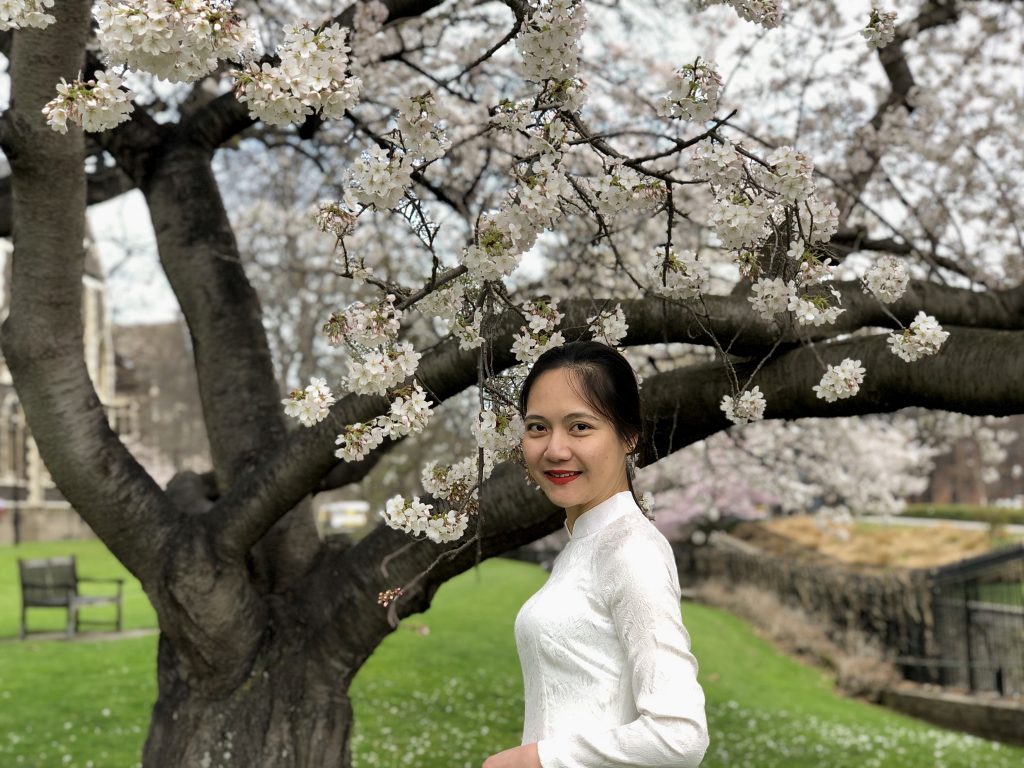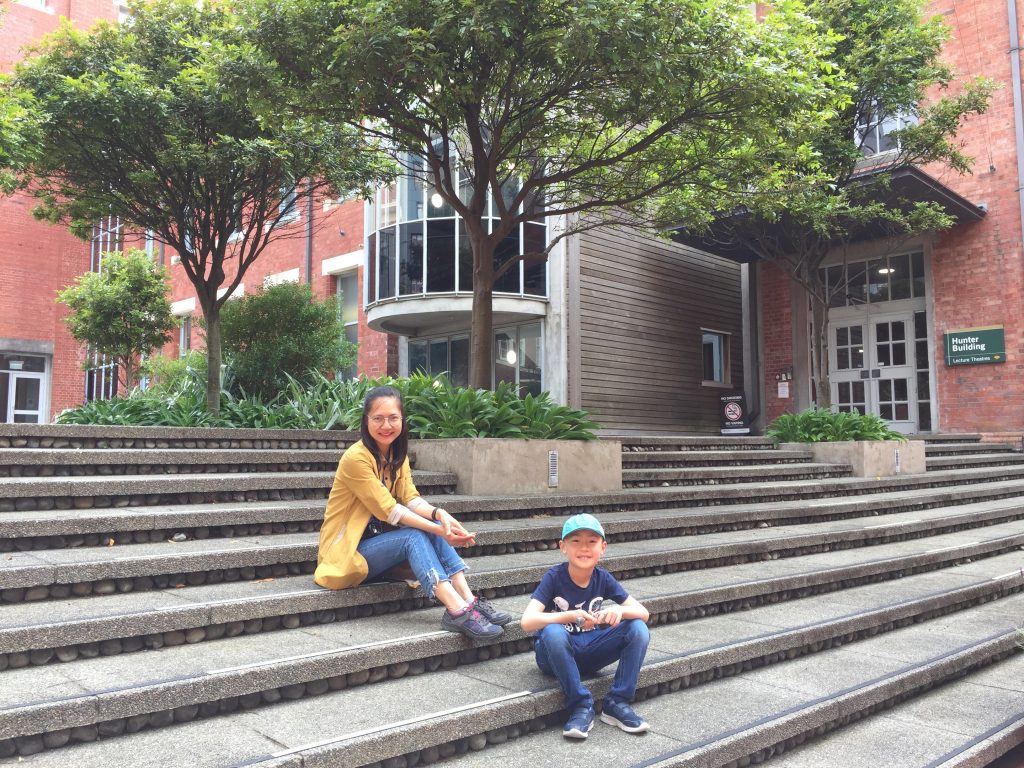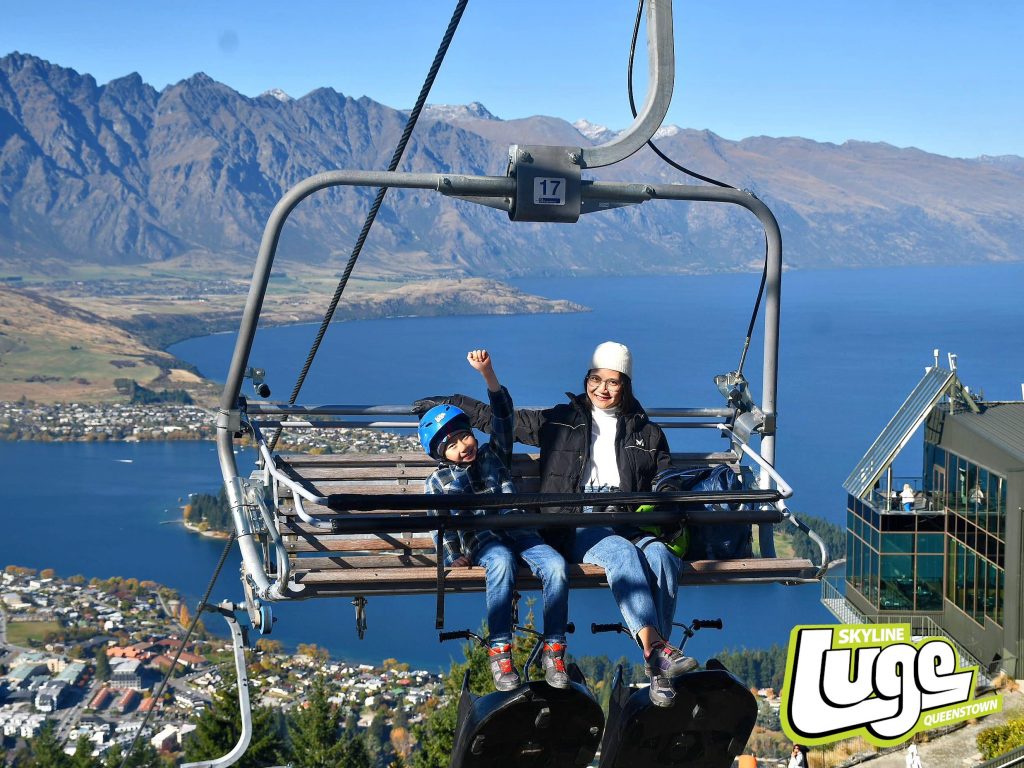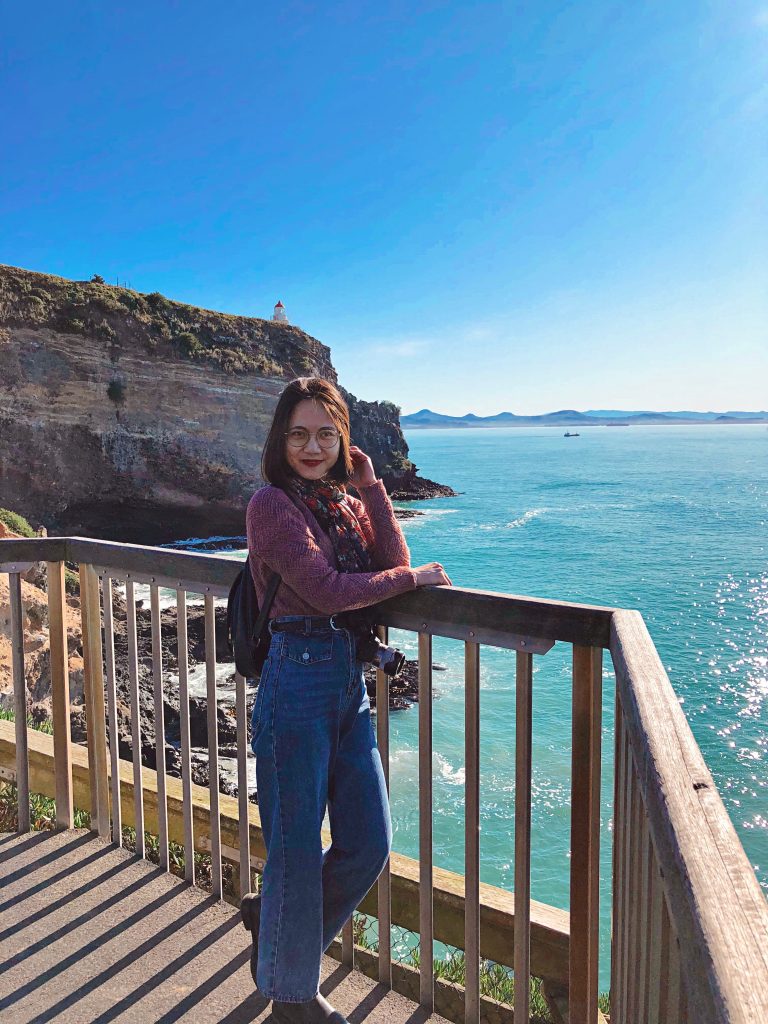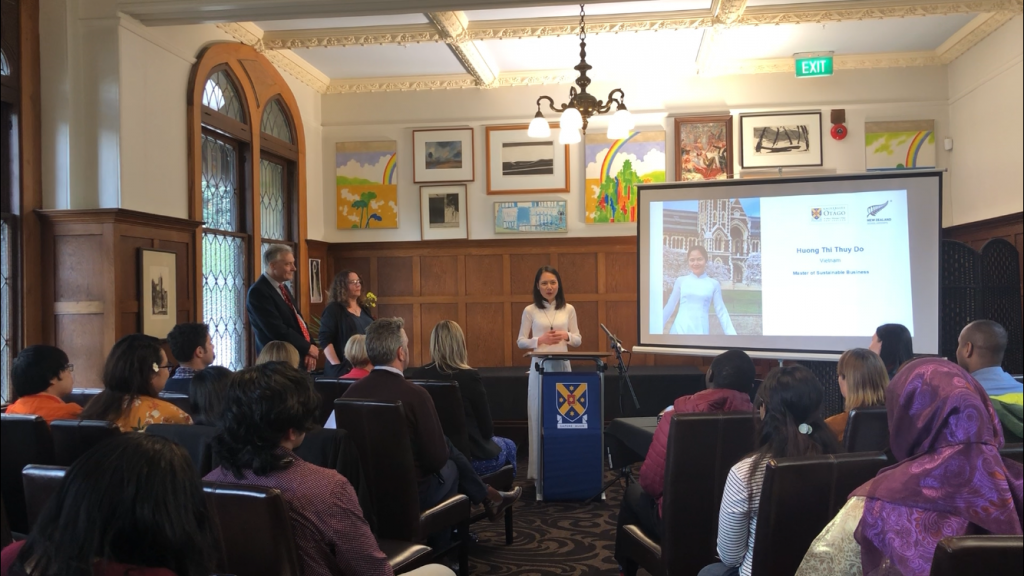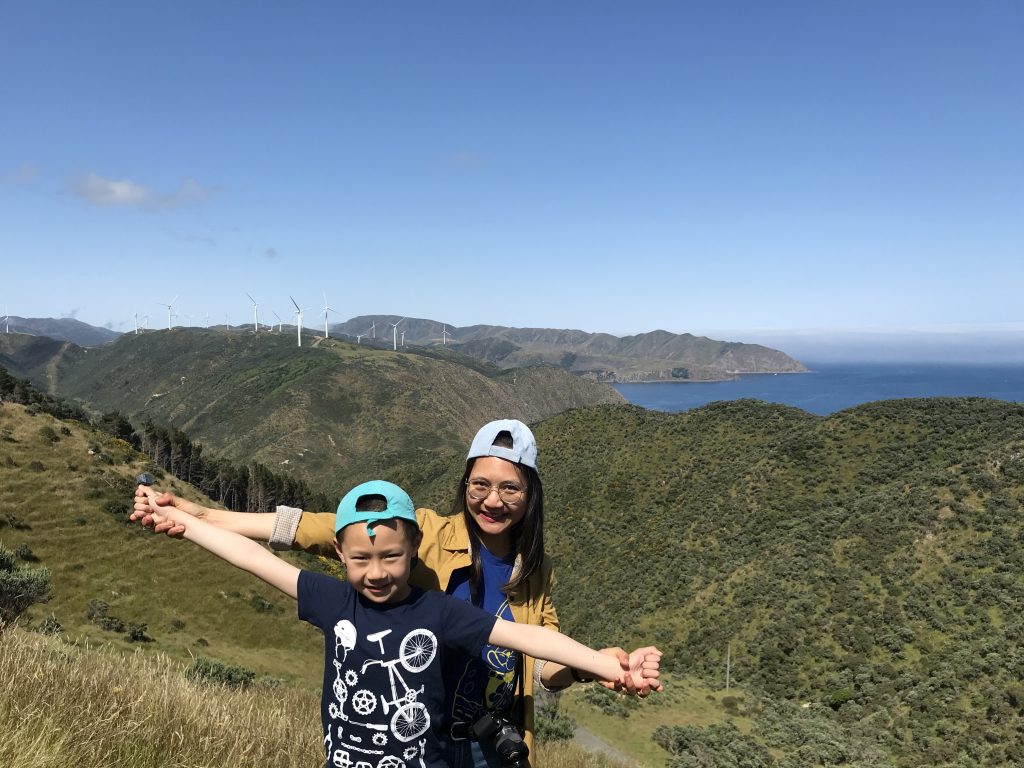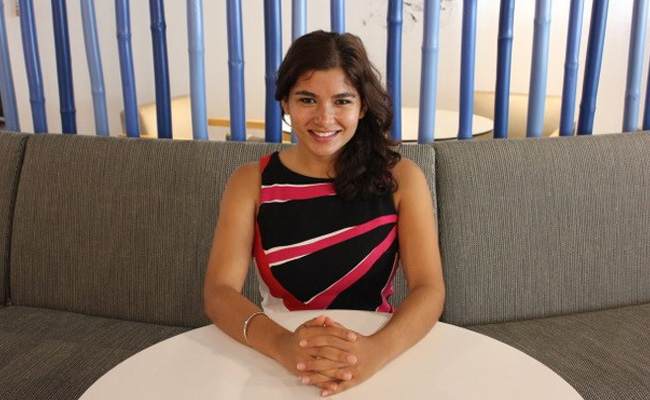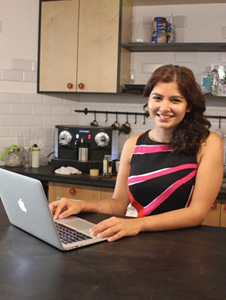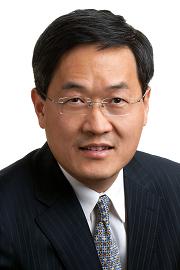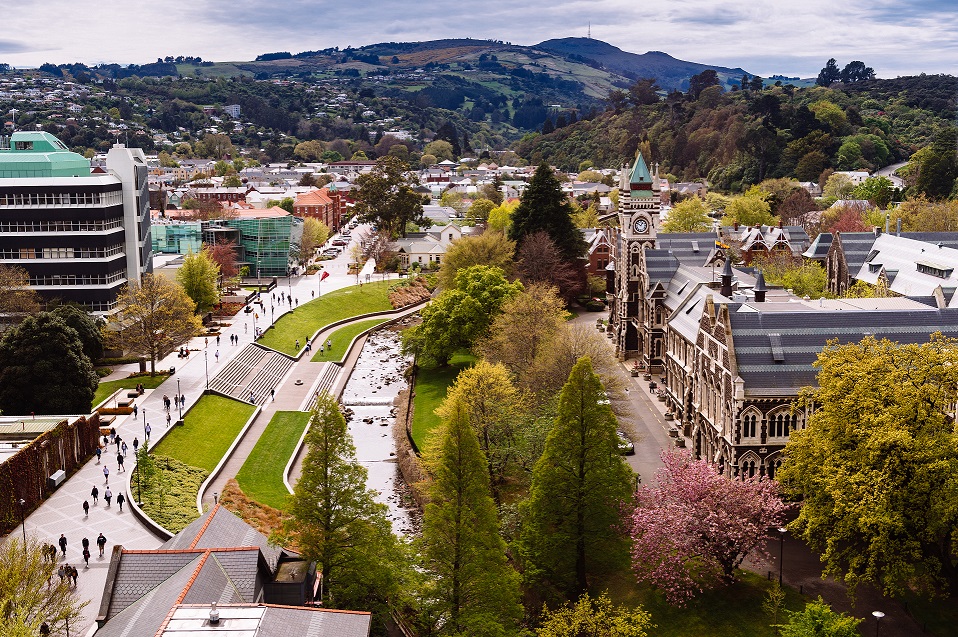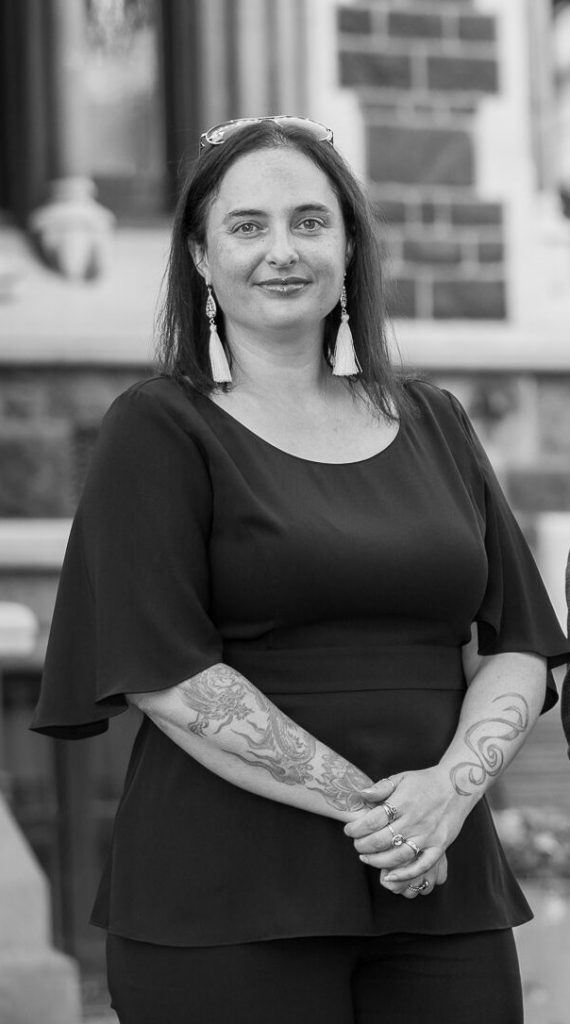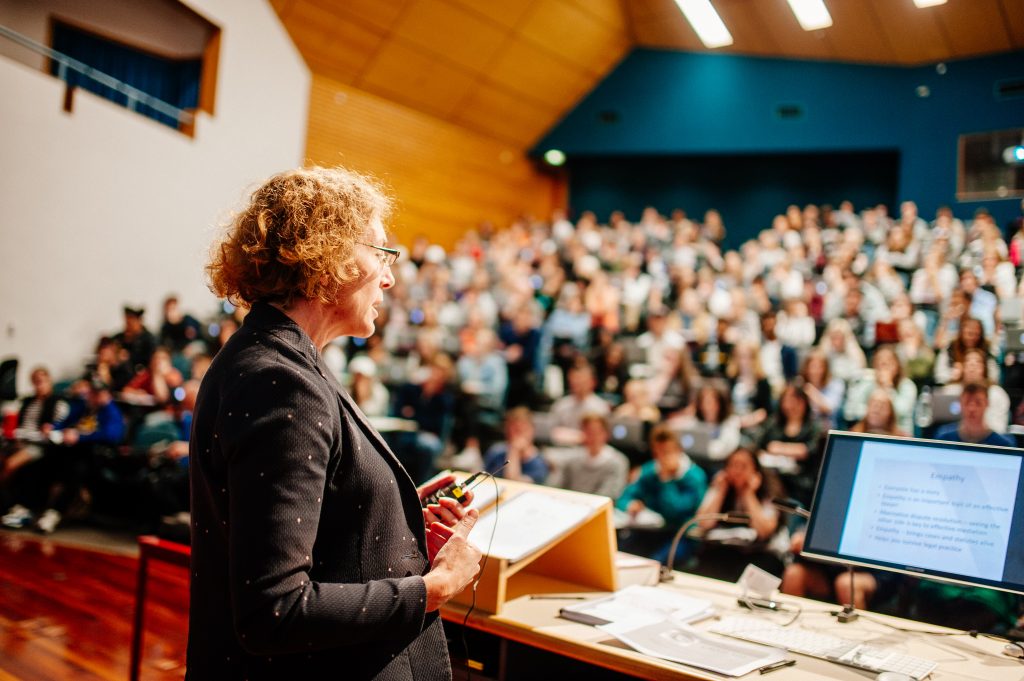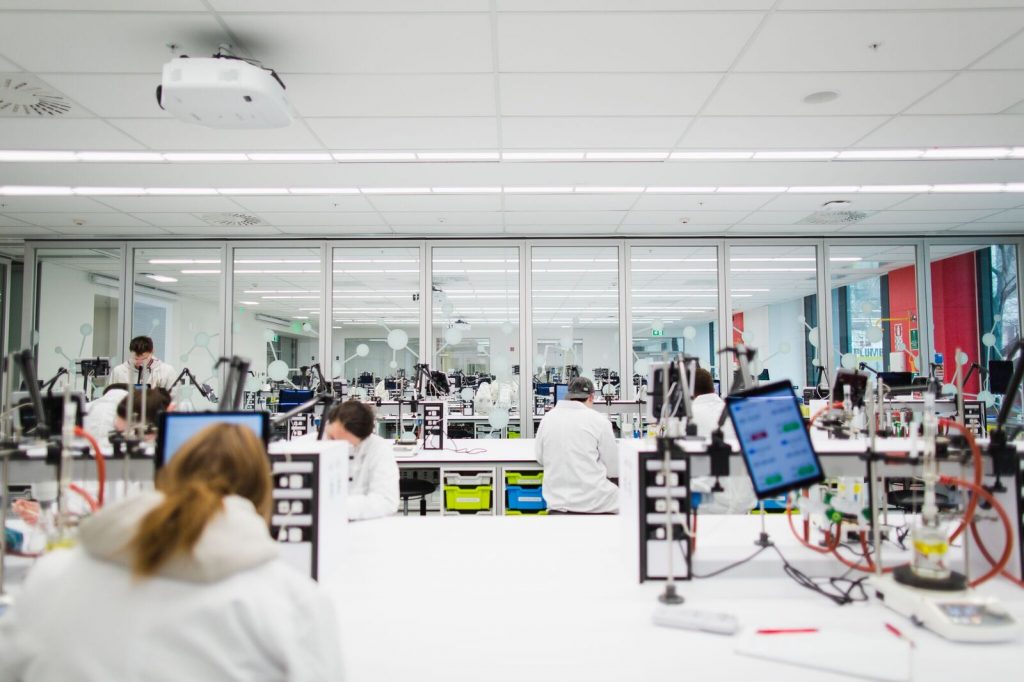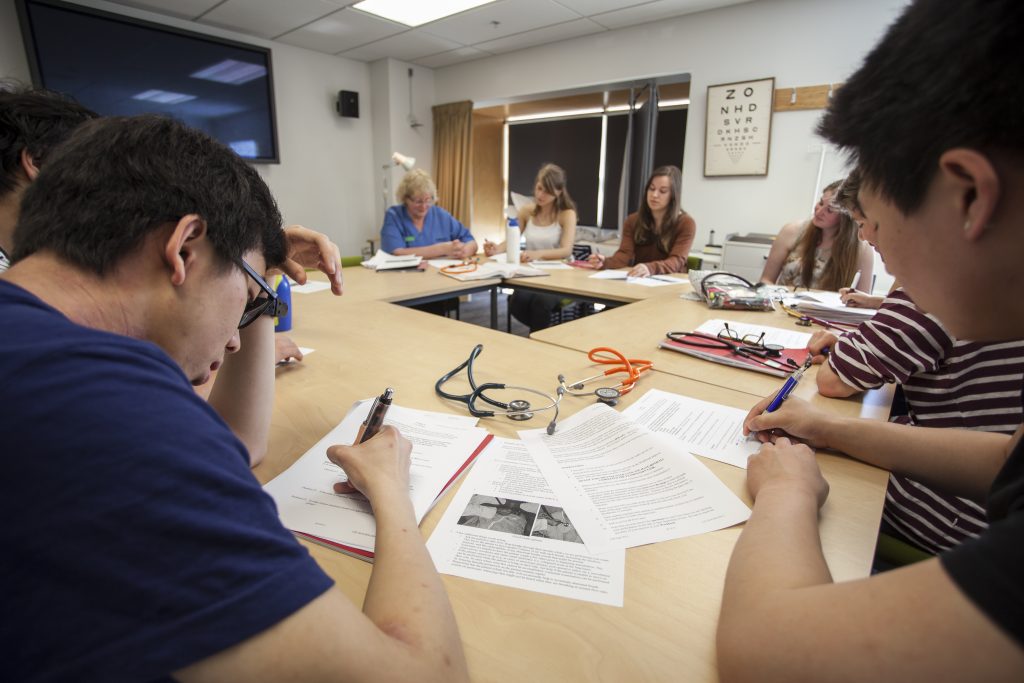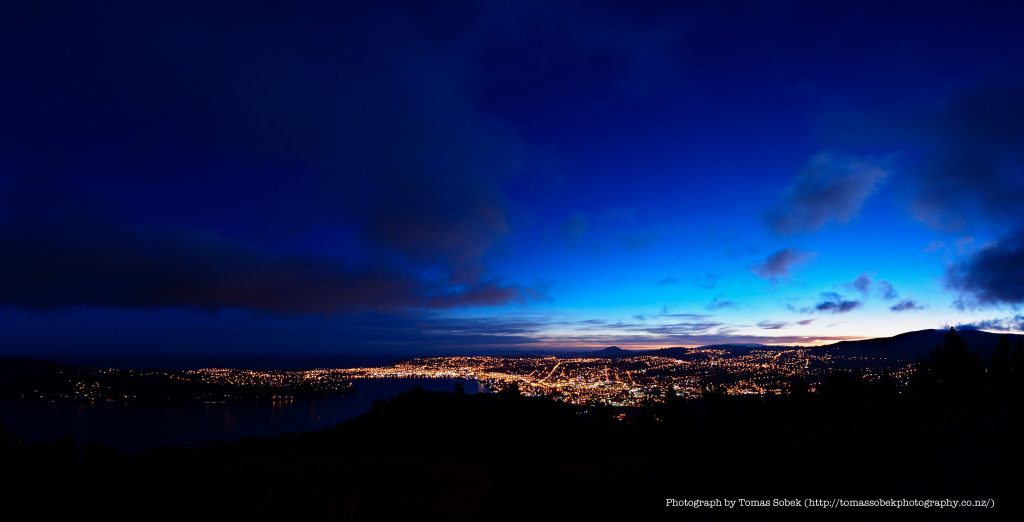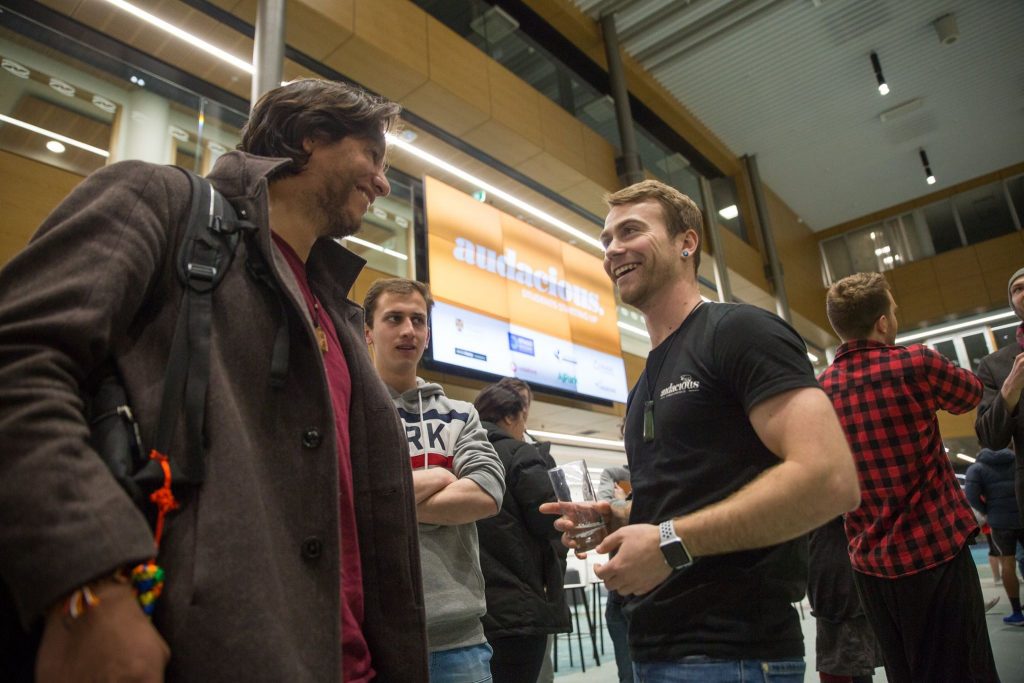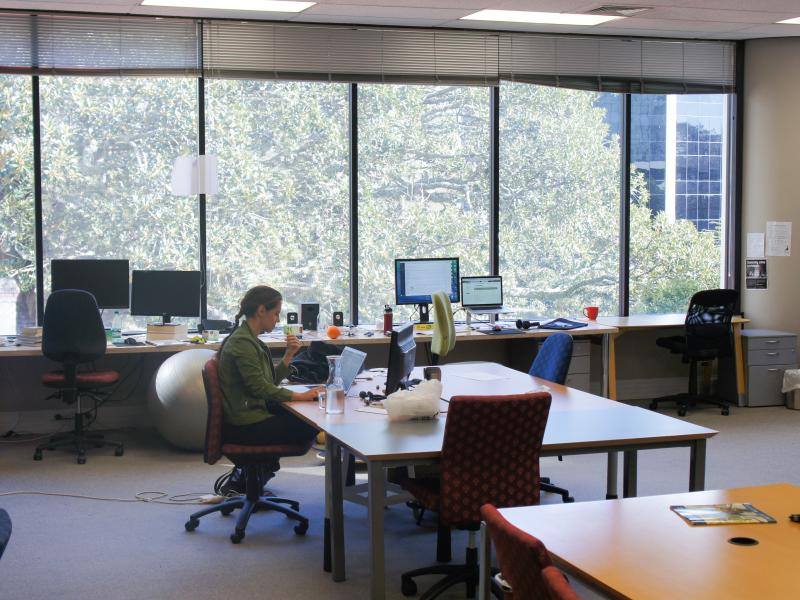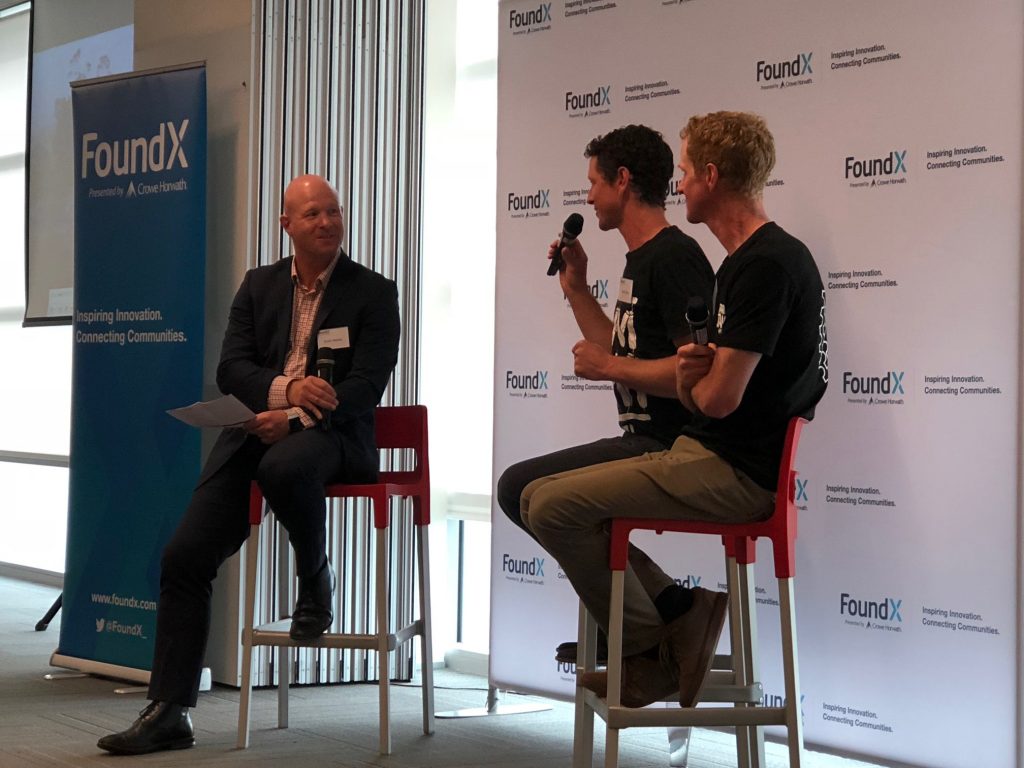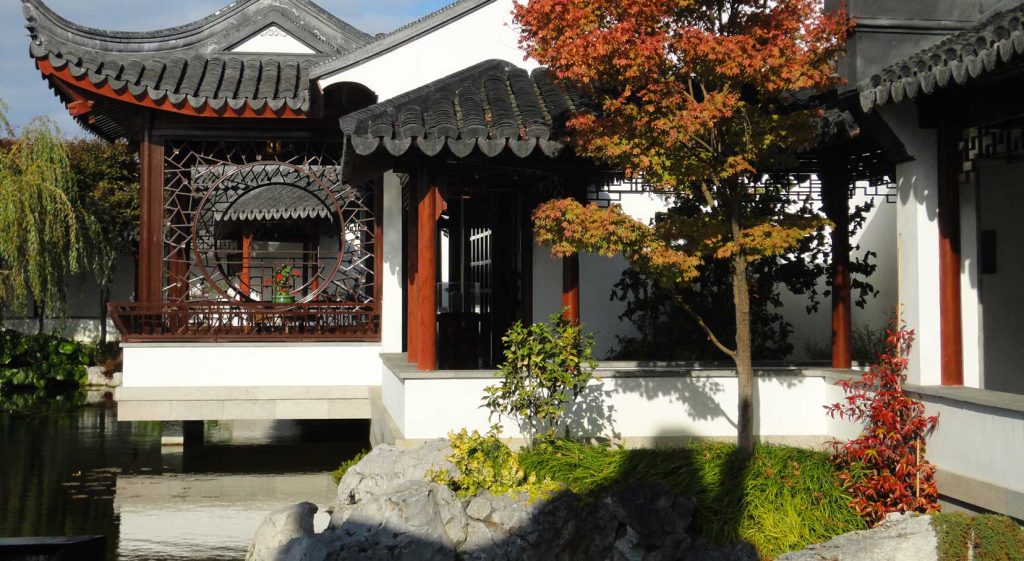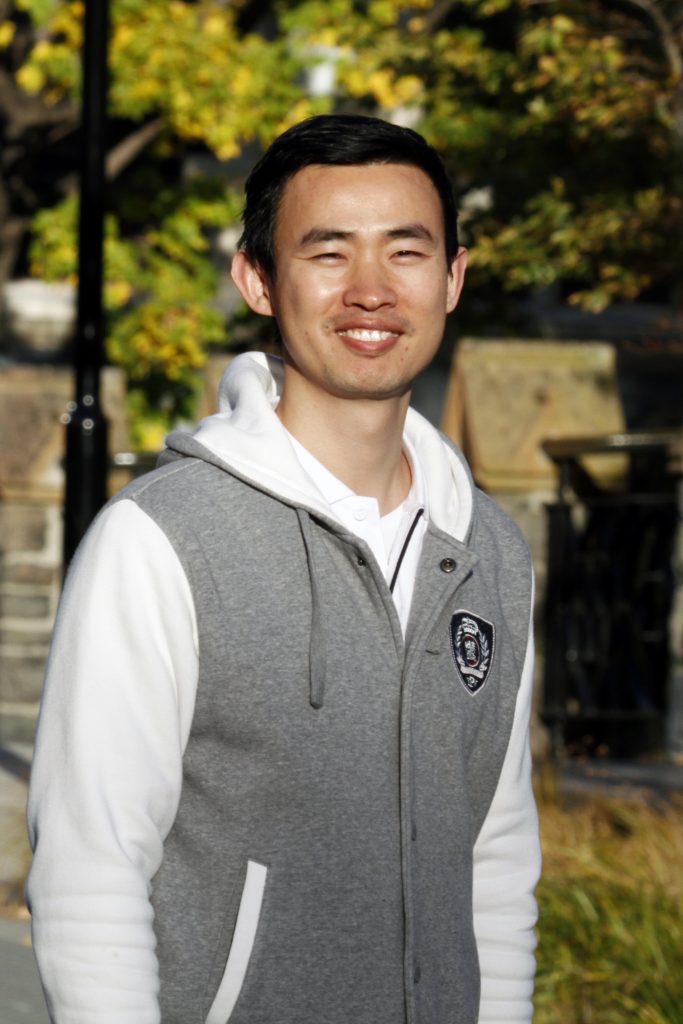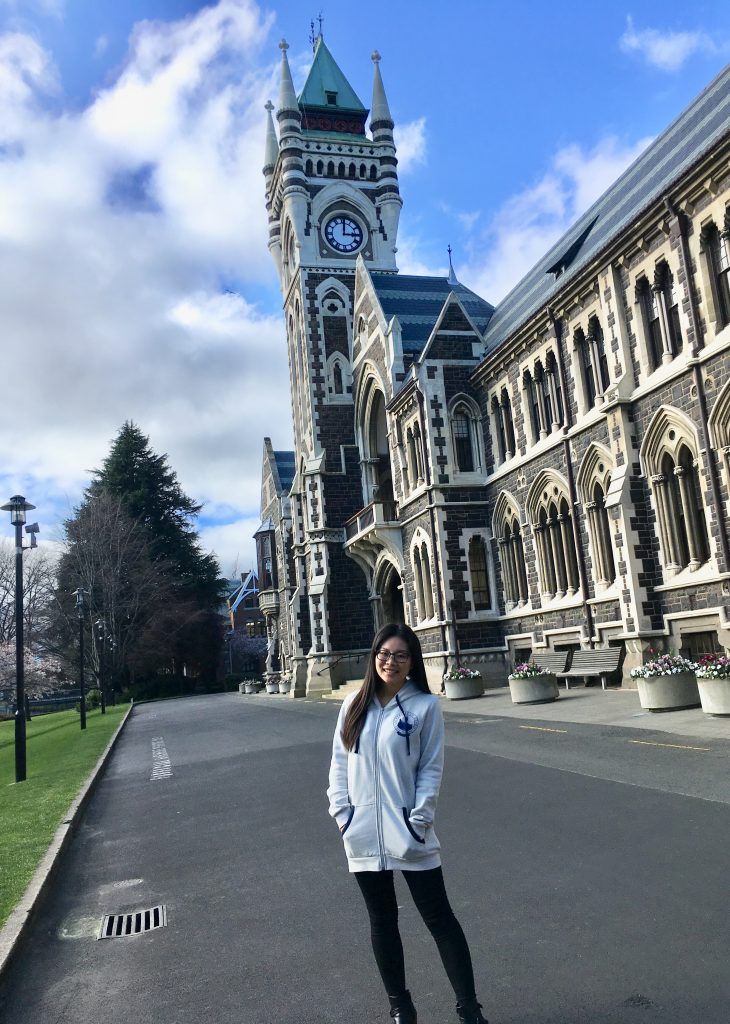Finding resilience, educational achievement and a sense of belonging amidst the COVID-19 pandemic.
NZ Scholarship recipient Huong Do (Vietnam) graduated with a Master of Sustainable Business (MSusBus) with Distinction from the University of Otago earlier this year. This is an achievement in itself, but add parenting; living far from home; working remotely; English as a second language and the COVID-19 pandemic. One of these ‘extra’ factors could have been enough to alter the course that Huong Do was on, but she continued on her journey and along the way discovered a sense of belonging, a resilience she did not know she had and educational and life skills that will improve not only her own life, but those that she comes in contact with in the future.
Question 1: Where did you first hear about the University of Otago? Why did you choose Otago over other universities in New Zealand and/ or the rest of the world?
On an autumn day in August 2018, when searching in vain for a course that was most relevant to my professional career as a Corporate Social Responsibility Specialist, I unexpectedly found the line “Master of Sustainable Business at the University of Otago, New Zealand” – this was the first-time I had heard of the University of Otago. I chose the University of Otago over other universities and the rest of the world because they suited my educational needs the most and I was very interested in the course offered. I also declined one offer from the University of Waikato (my second preference for NZ Government Scholarship) and the University of Auckland (for ADB-Japan Scholarship Program). I had a feeling of “belonging” when I read about Otago and the selected course’s description was exactly what I had been looking for.
Question 2: How long did you study at Otago? Did anything about life at Otago surprise you?
I spent 13 months completing the MSusBus at the University of Otago from Feb 2020 to the end of Feb 2021. Due to the complexity of the Covid-19 situation however, my stay in Dunedin was extended till mid of May 2021.
Prior to my departure from home, many friends told me that it was going to be extremely challenging with an intensive one-year studying schedule; a remote working position; being a full-time mother and in such a strange city in a land far away from my home country. But I proved myself in overcoming these potential challenges and being open to new experiences. What surprised me most was not the incredible beauty of the city, the food of a western country, the cold weather of the South Island, or the intensiveness of the coursework, but the people. I prepared myself to meet new people with different characteristics, mindsets, and lifestyles. I kept reading about Kiwi’s friendliness and kindness, but it turned out to be beyond my expectations. From my first day at Otago and over the course of my time there I never felt like I was treated as a stranger – I was welcomed and encouraged by both the University and residential communities. I felt happy every time I walked along the street and received greetings from people who I did not know. The kindness of Dunedinites gave me feelings of warmth and acceptance enabling me to feel secure, even when it times were tough.
Question 3: How did you find the learning/teaching environment at Otago? How is it different to what you have experienced at your previous university (either at home or in another country)? What was your experience with your lecturers/ supervisors like? How was your experience with other Otago staff and people (besides your lecturers/ supervisors)?
I found the learning environment at Otago extraordinarily rich and positive. As a post-graduate student engaging with a small number of classmates and lecturers, I had a precious opportunity to observe and gain insights about the learning environment. Firstly, the program is designed and launched in a student-centred manner. The lecturers did not solely lead us – we could participate and even design the way the knowledge was delivered rather than just having to memorise it. It was my great honour to learn from experienced and wonderful lecturers who all promoted the important role of creativity and critical thinking engaging all students in exploring ideas and issues, challenging traditional assumptions and handling complexity. COVID-19 restriction measures meant we couldn’t continue in the classroom but our lecturers and the University in general quickly responded and adopted many new methods to engage and continue with our learning.
I really would like to highlight the resourceful nature of the lecturers at Otago. They kept their minds open, valued diverse kinds of students all with differing ages, professional and cultural backgrounds. Coming from a developing country and using English as a second language meant that in the early days I was very concerned and anxious that I would fall behind. This feeling did not last as my thoughts, opinions and ideas were all respected and encouraged by the lecturers. As a result, I could identify my place in the class and gain the confidence to work on my ideas.
Otago has an exemplary learning and teaching environment. Academic and applied/ practical knowledge, skills, motivation, and the mental health of students were all positively taken care of.
Aside from my lecturers and supervisor, my main engagement with other Otago people was mainly around International Student Advisors, Ask Otago, and cafeteria staff. Typing these lines reminds me of all the grateful memories I have. During the hard time of isolation due to COVID-19 restrictions, the cold of winter or the pressure during the thesis writing period, I was not far from the warmth of emails, smiles and greetings from them all.
Question 4: While studying at Otago, what were other activities that you engaged/ experienced (Part time job? Travelling? Volunteering? Tutoring? Etc). Please share with us any thoughts/observations that you gained from these experiences.
2020 was a special year for every person living, working, and studying in New Zealand. Due to the impacts of the COVID-19 pandemic many people could not fulfil goals and objectives. But thanks to the safe and effective measures put in place to control the situation in New Zealand, I felt still luckier than many students and citizens in other countries. While studying at Otago, other than spending most of my time completing my studies I was still able to handle a job in Vietnam, travel around, learn new knowledge and skills as well as engage in some light volunteer work.
As a student enrolling in the Master of Sustainable Business I always found the relevant opportunities to enhance and apply my knowledge of sustainable development. By maintaining my job as a Senior Compliance/ Sustainability Officer I could create links between the theories, frameworks, models, methods, case studies and my real work with my employer . At the same time, I could turn my occupational experiences into valuable input and examples for the classroom.
Regarding travel, trips end but memories stay forever. Although I could not travel alot due to the limitation of time and effects of the pandemic, I was inspired by the New Zealand tourism industry. Among a variety of destinations, Queenstown and Auckland were my son’s and my favourite places. While Queenstown reminded me of a small but famous tourist oriented town in my home country, the vibrant and crowded Auckland attracted my son. No matter how far and long our trips were, we both felt the beauty of NZ’s landscape and the warmth and friendliness from the people we met.
Over summer I had opportunities to attend cooking and bread making classes, as well as learning how to compost in our flat/ house/ office with the ‘Summer at Otago’ program. Volunteer work at the Community Garden also brought me new experiences. I was grateful to take part in these programs and activities as they all related to my interests. They not only made my stay in Otago more memorable but also equipped me with insights and knowledge which I can apply when I returned home.
Question 5: Overall, how did you find the ‘culture’ of the students, staff, and people that work at the University of Otago?
From my perspective, everyone studying, working, and serving at the University of Otago successfully shapes its uniquely diverse and consistent culture. I was impressed reading about the University’s history and was amazed upon my arrival at the campus on the first day. The atmosphere around the campus was extraordinary – relaxed and comfortable yet the spirit of people was very strong, focused, and positive. As the oldest university in the NZ Otago’s culture was rich with traditional values, but the modern aspects of the University are applied and promoted by students and staff. I read about the University’s four core values, and I observed these values were present in the students and staff I met. The respect, integrity, curiosity, and community values were reflected through the words and actions of the people I encountered, no matter what level of management, where they were from, what they were studying – all were working to contribute to the development and success of the University.
Question 6: What were the standout features of living and studying at Otago?
I personally love Otago as it suits my ideal for living and studying so much. Dunedin is a smaller and less populated city than my home city, it is not as crowded or noisy. It is peaceful yet convenient so a student can focus on studying while at the same time enjoy the beauty of nature and people.
Question 7: Overall, did Otago Uni meet your expectations? Tell us why or why not?
The University of Otago completely met my expectations. The fear of not finding a feeling of “belonging” prior to my arrival well and truly abated during my time here. Although I lived far away from home, the University of Otago and Dunedin became my second home and I felt fulfilled both academically and socially. It was not only about the academic quality, but Otago also widened my graduate employability as I gained knowledge for interpersonal and conceptual skills, strategic planning, and independent judgement. Furthermore, Otago will always stay in my mind for its beauty – magnolia blooms, cherry blossoms, moody clouds and sustaining rain, I felt such pride being in one of the world’s most beautiful campuses. I also appreciated the communication given – even during the tough times of Covid-19, I could see the quick responses, firm decisions, clear and positive communication from the University management and staff. This helped me to better plan, stay strong, and be positive that together we would overcome the hardship.
I still remember at the end of NZAID scholars’ integration week, Associate Professor Vivienne Anderson let us write a letter to ourselves in the near future, to describe our expectations and desires while we were at Otago. When my journey was nearing its end I had the chance to meet her and other scholars, where I received the letter I had written upon the start of my journey. I felt amazed. I had a good performance in my learning, become acquainted with study and the lifestyle of Otago. I also spent precious moments with my companion, teaching him and learning from him at the same time.
When you’re back home:
Question 8: How would you describe the University of Otago to somebody who was thinking of studying as an international student at Otago?
When thinking of studying as an international student at the University of Otago, I am sure that you have searched and read a lot of valuable information posted on the University’s website and other trusted sources. I hope this advice is helpful to you – you can trust what you read and heard about Otago as it is true. Follow your heart as it can lead you to an incredible place. Finally, do not hesitate to challenge yourself at Otago – you will have one of the most wonderful times in your life there.
Question 9: What is the best memory you will take home with you from your time at the University of Otago?
Every moment at Otago is memorable and beautifully captured through my camera and my memory. I also have my companion reminding me of many events that happened during the time we spent at Otago together. However, if it is a must to choose the best memory, I will talk about the Scholarship Completion Ceremony held last October. During 2020 many classes were transferred to an online platform, many events were virtually hosted, and a lot of ceremonies were affected or cancelled due to the outbreak of the COVID-19 pandemic. However, the Completion Ceremony was successfully organised just one day after my very last class of the final semester – an important milestone for our journey. Thanks to the NZ Government, MFAT and the University of Otago I travelled so far to pursue my dream. The ceremony then gave me an official opportunity to present my gratitude to them and my loved ones even though they could not attend in person. Being the only Vietnamese scholar and wearing our traditional costume at the ceremony, I could not hide my tears and mixed feelings. I was extremely happy and fulfilled for doing well in my classes, but I was also sad at the same time as the time to say goodbye to Otago was coming. The event also gave me a precious opportunity to meet other scholars and congratulate them on their amazing achievements.
Question 10: How do you apply the study & experience you received here to your current work? Has your experience of studying at Otago had a positive impact on your life now, at home? If you take a look at yourself before and after going to NZ, what is the biggest change that you notice?
Since I mentioned above (Question 4) about my application of knowledge into the work and vice versa during the course, it should be noted that I did not need to wait till the end of my study and return. It meant a lot to me and my employer as my academic experience became more practical, and applied. My study at Otago has levelled up my understanding and skills on research, I was terrified about research before, but Otago positively changed that so that I could better handle my work.
My experience of studying at Otago is positively impacting my life back in my home country – like many overseas students studying abroad, I learnt how to better manage my daily routine, overcome challenges, and explore new aspects of myself. I had always assumed that it was too difficult to achieve work-life balance no matter how hard I tried – but looking at myself now, I am proud to have gained positive results from working, studying, and enriching my personal life.
The biggest change that I have noticed since studying at the University of Otago is the concept of the word resilience. I paid attention to this term when my classmates and I discussed climate adaptation and mitigation during the class of “Developments in Environmental Management” and I have been thinking about it ever since then. I then came to realise how I felt/behaved when I was when coping with changes or difficulties – since my time at Otago my anxiety lessened and I felt more calm and confident. I concluded this in my speech given at the Completion Ceremony with a thanks to all for helping me to become a better person who is more and more resilient day by day.
Nicky Richardson is an International Marketing Coordinator at the University of Otago. With degrees in music and marketing, both from Otago, she is passionate about education, and the places it can take you.
Inspiration for women who want to be the boss.
E-learning company GoSkills’ co-founder Bhavneet Chahal says her experiences at the University of Otago kick-started a career helping others learn about IT and realise their potential.
Bhavneet completed a Bachelor of Applied Science with first-class honours, majoring in molecular biology in 2006. She later gained a Master of Entrepreneurship.
While working for Groupon in Sydney, Bhavneet realised that online courses were a growth area but that they were not always providing the quality content required by professionals looking to expand their skills.
Since being founded in New Zealand in 2013 – with input from Otago Professor Paul Hansen – more than 104,000 users have signed up to access GoSkills’ 50+ online learning courses.
Bhavneet backs up her advice for young women wanting to start their own business with practical assistance; she proudly supports two $2,000 scholarships each year. The title of these awards leaves little room for misinterpretation: they are called the Scholarship for Women Who Want to be the Boss.
 How did Otago help to shape your life and career success?
How did Otago help to shape your life and career success?
I studied Applied Science as an undergraduate and, while I always enjoyed science, I couldn’t see myself pursuing a career as a researcher or scientist.
During the last year of that degree I found a student business competition on campus called Kickstart. I entered the competition with a business idea and I was a winner in the first round and a finalist in the competition’s second round.
This opened up my eyes to a totally different world of business and entrepreneurship. I then completed a Master of Entrepreneurship to learn practical skills to start and grow a business.
This degree was right up my alley, I learned the fundamentals of business and felt prepared to one day start my own company.
 Highlights and interesting memories of your university days?
Highlights and interesting memories of your university days?
Definitely the residential colleges; when I first arrived at Otago I stayed at St Margaret’s College. I later worked as a Residential Assistant (RA) at Cumberland College, which was known at the time as being a bit of a party Hall. It was then that I realised what being an undergraduate at Otago was truly like! I was glad I started off at a relatively tame place and could ease into uni life. Some of my best friends today are people I met at both St Margaret’s and Cumberland!
 Recollections of favourite or standout lecturers?
Recollections of favourite or standout lecturers?
I had two standout lecturers. The first was Richard Higham – he was about 79 when I took his class during the Master of Entrepreneurship. I was inspired by his sharp intellect, boundless energy and superior Excel spreadsheet skills! He was able to bring our class together and teach us how to grow a business in a fun and dynamic environment.
The other standout lecture is Professor Paul Hansen – an economics lecturer and part-time surfer. I was drawn to Paul’s energy and passion for his craft – economics and business. It’s no wonder he’s won student popularity awards and it’s also no coincidence that he’s now my business partner at GoSkills.
 What are your career or personal highlights?
What are your career or personal highlights?
Starting a company from scratch, pulling together people and resources and growing it into a global business. Our team can work from anywhere in the world and we sell to customers the world over. Building a business that pushes the boundaries of being in a global and connected world has been extremely fulfilling.
 What are your future goals?
What are your future goals?
Keep building businesses, help others build and grow businesses, and world peace – naturally!
 What advice do you have for current students or students considering studying at Otago?
What advice do you have for current students or students considering studying at Otago?
Make the most of every opportunity. There are so many facets to university life – try them all. Join random clubs, try sports you might not have ever considered, enjoy the unexpected friendships you will form along the way. It’s only when you try loads of different things that you discover what you truly like and figure out who you are. University is a time to try things in a safe environment and set yourself up for a future that most aligns to who you are and where you want to be.
Many thanks to the team at the University of Otago Alumni & Friends for providing the content for this blog!
Nicky Richardson is an International Marketing Coordinator at the University of Otago. With degrees in music and marketing, both from Otago, she is passionate about education, and the places it can take you.
Further your knowledge and your career – study for a Master of Finance at the University of Otago.
For previous generations the completion of an undergraduate degree would provide a direct pathway to secure employment. But in 2019, with the advent of globalisation, world travel is now affordable and accessible, the global population is increasing and living longer, so naturally competition for employment has subsequently increased.
So, as much as an undergraduate degree is an achievement and a sign to a potential employer that you have the tenacity to commit to a period of study, it may no longer be enough to give you the edge over another candidate/student, and that’s where postgraduate study comes in.
The University of Otago has a range of postgraduate study options, and today we will focus on the Master of Finance (MFinc), and associated scholarship opportunities offered by the Otago Business School’s Department of Accountancy & Finance.
Where to from here?
So, you’ve completed an undergraduate degree – congratulations! Or, perhaps you’ve been working for a number of years and you feel that there are gaps in your knowledge base/skill set that are holding you back from moving forward in your chosen career path? If you are seeking/currently in a career in the finance industry or for financial specialists in non-financial firms the Master of Finance (MFinc) is the qualification for you. The study options within the degree are designed to offer a number of pathways for you depending on your academic background and career aspirations. The primary pathway is for strong graduates of mathematically-oriented degrees such as mathematics and statistics, physics and economics.
Key information about the Master of Finance (MFinc):
- 12 month (February to February) full time study
- Seven taught papers plus either an applied or research project
- Applicants with a mathematically oriented degree and normally with an average grade of B+ in the papers satisfying the final year major subject requirement for that degree are encouraged to apply
- Applicants with relevant practical experience may also be considered if the B+ average is not met
If you complete the Applied Project (FINC501) option you will have a wide range of career opportunities in commercial and investment banks, brokerage and investment firms, insurance companies, treasury departments of non-financial corporations, regulatory agencies, consulting and accounting firms. If on the other hand you complete the Research Project (FINC580) you will also have the ability to design and pursue a large project of independent research and consider a Master of Commerce (MCom) or a Doctor of Philosophy (PhD) in Finance.
The Master of Finance (MFinc) will equip you to be either:
- Professional practitioners in the field of Finance; or
- Academic researchers in the discipline of Finance
Internationally renowned lecturers
Professor Jin Zhang is Professor of Finance at the University of Otago. Jin was previously Associate Professor at the School of Economics and Finance, the University of Hong Kong (HKU). Jin Zhang received his B.S. and M.S. degrees from Tsinghua University in 1985 and 1988, respectively. He received his Ph.D. from the California Institute of Technology in 1996. After spending one-year as an associate at Morgan Stanley in New York, he went to Hong Kong to teach Financial Engineering at City University Hong Kong from 1997 to 2001, and Hong Kong University of Science and Technology from 2001 to 2004, and then HKU from 2004 to 2012. He has served as the Director of Master of Finance program and Associate Director, Center for Financial Innovation and Risk Management (CFIRM) at University of Hong Kong from 2009. PLUS on top of all of these academic achievements Jin was awarded the OUSA 2018 supervisor of the year award for the Accountancy and Finance Department!
Advice from a former Master of Finance (MFinc) student
Long Bui graduated with a Master of Finance (MFinc) in May 2019 and he had this to say about his experience:
“Completing the MFINC degree at the University of Otago has given me an opportunity to take a step forward in my finance career, i.e. to become a portfolio manager. As I moved on to management level in the asset management industry, I realised that having a solid background in financial analysis and fluent asset pricing technique is just not enough. You also need to be confident when encountering and discussing different advanced topics with your management colleagues and other specialists in this industry.
Confidence comes when you get rid of your fear and “the oldest and strongest kind of fear is fear of the unknown”.
In this regard, the MFINC program enhances my knowledge on various aspects of finance, which were unknown to me before, such as mathematical finance, advanced corporate finance, advanced financial econometrics and energy carbon finance. I also had a chance to learn how to prepare and write academic research. Not to mention that I had hands-on experience in doing real life projects in risk management, electricity trading, stocks momentum effect using Matlab, STATA, and Excel simulation. All of the above fill the missing pieces in my whole picture of the broader finance world.
Besides, the MFINC lecturers are very supportive and dedicated, with their “heavy” and comprehensive course materials. Therefore, I would be more than happy to recommend the MFINC program to not only someone who wants to climb higher in their career ladder but also to those who think of starting their very first journey into the finance world.”
Apply now and receive a $10,000 scholarship
The Department of Accountancy and Finance is currently offering international students, who fit the admission requirements of the Master of Finance (MFinc), and wish to commence study in February 2020, the opportunity to receive (based on academic merit) a NZD $10,000 scholarship.
Further your knowledge and your career with the Master of Finance (MFinc) from the University of Otago, Dunedin, New Zealand.
Applications close 31 October 2019.
Nicky Richardson is an International Marketing Coordinator at the University of Otago. With degrees in music and marketing, both from Otago, she is passionate about education, and the places it can take you.
Study Accounting at Otago – yeah…..nah?
Accountancy as a subject and a profession can sometimes get a fairly big ‘yawn’ reaction from people, but how much do you know about studying Accounting at the University of Otago? Unless you are a current accounting student, or you already know your chosen path and you’re planning to study accounting, maybe you’ve never really delved deeper below the surface of this possibly misjudged and maligned subject? We are going to take a look at the history of accounting at Otago, the current teaching and department strengths and affiliations and the opportunities a qualification in accounting can bring you career wise, plus current scholarships available. Let’s see if we can surprise you, who knows, you may change your mind on studying accounting at Otago and go from a yeah nah, to a yeah, yes, absolutely!
The History
The University of Otago has been teaching Accountancy and Commerce since the early twentieth century, so if you look at that from the perspective New Zealand was only settled by Europeans in the mid to late 19th century, 107 years is old in this country. And although history is wonderful, and can teach us so much, history isn’t what is going to convince you to come and study Accounting at Otago, it is the present and future that really matters.
The Present
The Department of Accountancy and Finance is a member of CFA’s University Affiliation programme, offers a Visiting Executive in Residence programme that provides for a top industry leader in either Accounting or Finance to spend a week presenting seminars and meeting with students and staff. IRD, ANZ, ACC, NZX and directors of multiple companies have attended.
However, this picture shows the present and very human face of accounting at Otago – Nicola Beatson, and she is anything but boring. If you want to get enthused about this subject, this is the teacher – she seriously loves it! Nicola is also one, like so many of our academics who sees each student as an individual, and not just a number.
“Each student is an individual who comes into the lecture with a different set of experiences. I constantly remind myself that although the words I’m saying make perfect sense to me, to students sometimes it can be confusing and hard.”
Nicola joined the Department of Accountancy and Finance at the University of Otago in 2010. Since that time she has had several teaching accolades, including being awarded the prestigious Otago Teaching Excellence Award this year, the Disability Information and Support Appreciation Award in 2016, OUSA’s Top Ten Lecturers teaching award in 2015, Premier Commerce Teaching award in 2017, and the Overall Premier Lecturer award last year.
“I love teaching accounting as I get to share my love of a complex, dynamic discipline, and dispel the myth that accounting is boring. It’s a wonderful, complex and interesting discipline that is based on human decision making and judgement. If my students can see that accounting is more than just punching numbers into a calculator – although that is fun too – then that would make me very happy.”
The Future
If you choose to study accounting at Otago, rest assured employment prospects for our graduates are exceptional, and global.
Study for the life you want
The Department of Accountancy and Finance offers undergraduate and postgraduate study choices. Gain knowledge and experience that will be an asset in any career.
An understanding of accounting is important for everyone. Accounting takes you places, and can open doors to a range of exciting industries. Looking to practice accounting, work in a business environment, or just wish to be a better informed consumer or shareholder?
Accounting is for you.
Accounting at Otago covers five main areas:
- Financial accounting
- Management accounting
- Financial management
- Taxation
- Auditing
No experience or background in Accounting?
No worries. We have the perfect solution, the Master of Professional Accounting (MProfAcct) and we are offering 10 x $10,000 (NZD) scholarships for this programme to international students.
The Master of Professional Accounting (MProfAcct) is a professionally
accredited accounting programme aimed at graduates of any discipline
who want to pursue a career in accounting.
Programme features:
• Designed by both academics and practitioners
• Accredited by professional accounting bodies, CPA Australia and
Chartered Accountants Australia and New Zealand (CAANZ)
• Special focus on developing strong technical and professional
accounting skills, including communication and analytical skills
• Open to graduates of any discipline
Recent graduate of the MProfAcct, Annie Liu from China, had this to say about her experience on the programme:
“I appreciate I could finish my degree at the University of Otago. I am very grateful to all the teachers of the Master of Professional Accounting, thank you for your teaching and help. I also want to thanks to my classmates for helping me during my study. By learning MProfAcct, my accounting expertise has grown, besides, the important thing is the learning process, which has helped me improve my learning ability and expand my knowledge. I found in my work that a lot of the knowledge I have learned can be used. I’m so lucky to know and meet so much kind and lovely people in Dunedin. Thank you all!
I am currently working at Stonewood Homes, a well-known home designs in Auckland following completion of my MProfAcct degree”.
So, there you go, whether you have a commerce background, experience, or not, there are a range of opportunities available for you to study accounting at the University of Otago, Dunedin. And instead of thinking that accounting and studying accounting is boring, perhaps you can think again?
Thanks to the University of Otago content team for providing a lot of the academic information for this blog.
Nicky Richardson is an International Marketing Coordinator at the University of Otago. With degrees in music and marketing, both from Otago, she is passionate about education, and the places it can take you.
How will I learn at Otago?
If you are a new student to the University of Otago you will no doubt have a lot of questions……..and sometimes asking questions is challenging…..so, we are going to try to explain a few things here on our blog, like how do you learn at Otago? It might seem like a silly question, but trust us, no question is ever silly, and we have received a multitude of feedback from international students that suggests our teaching and learning style is different to other parts of the world. So, how will you learn here?
The Lecture
This will be your main source of information and knowledge for the majority of your studies. A lecturer, or a group of lecturers are assigned to teach each of the papers you are enrolled in. Lectures are held in specially designed rooms and last for 50 minutes – and the information is presented to you (as pictured) with verbal commentary following power point slides, printed material may be handed to you in class, including selected readings. Sometimes it may be tempting to miss a lecture, or two……(it is a beautiful sunny day and you’d rather be at the beach) but we urge you to not make this a habit – you’ve paid a lot of money to get this education, so be smart and take all the opportunities you can, including turning up to lectures.
The Lab
If you are studying towards a science or health science qualification, on top of lectures you will get used to spending a lot of your study time in laboratories, like the newly completed Mellor Laboratories pictured here. Here you will get the world renowned ‘hands on’ and practical learning style that we are so well known for here. This isn’t just sitting back and taking information in, this is you doing it all by yourself (with the guidance of a staff member of course!)
The tutorial
The tutorial is again something that we are really well known for – it’s a chance for more opportunity to really interact with staff and your fellow students. Tutorials, as opposed to lectures which can comprise of hundreds of students, are kept down to a smaller scale of approximately 10 students to one staff member. This gives you the chance to get one-on-one assistance, and the tutorial is also used as a way to help figure out the best way to go about an assignment, or to put you into teams to work on your skills working with others.
Self directed study
Another fact you may not know about studying at the University of Otago is that our academics believe you need to be self motivated in order to succeed. They can encourage, inspire and help, but ultimately you have to do the work. Making sure that you plan time to do the readings and to get onto the assignments ahead of the due date. Our tip? Buy a wall calendar/planner to outline all of your lectures/tutorials/labs and assignment deadline dates, it will really make life easier. It might sound a little dull, and something your parents might say, but we really do want these university years to be some of the best years of your life, so taking a little time to map things out will definitely help.
Nicky Richardson is an International Marketing Coordinator at the University of Otago. With degrees in music and marketing, she is a recent graduate of Otago herself – she loves Otago so much she ended up getting a job here!
Startup Dunedin……..what’s the story?
Dunedin is gaining a reputation for many things; wildlife, culture, food, street art, education and……..entrepreneurship. We caught up with chief story-teller and Marketing Manager of Startup Dunedin, Angus Pauley about what they do, and where Otago students can get involved. He’s very passionate about Dunedin and the start up community, so it comes as no surprise to us that this energetic and enthusiastic young man is one of our very own University of Otago alumni! Take it away Angus!
How to make Dunedin thrive
Every successful startup ecosystem has certain components which help it thrive. We look at successful startup ecosystems to see what we can recreate, improve and support to give Dunedin the same level of success.
What does Startup Dunedin do?
Startup Dunedin is a non-profit organization which coordinates the growth of the Dunedin startup ecosystem. We serve Dunedin based founders by providing the connections, resources and support they need to succeed. This includes initiatives we run, and connection to the initiatives other leaders drive in our city.
Students are a key component
Students are a key part of the startups in our city. They might become founders themselves through a programme like Audacious, or work in a startup as a consultant, intern or employee. Although only some students carry on with the ventures they start at University, all of them use the opportunities and entrepreneurial learning as a springboard for their career. So, how can students get involved?
Audacious
Audacious is a programme for students who want to build the skills and confidence to make a positive impact – whether they’re planning on working in a company, starting their own business or still figuring it out.
Each cohort runs semesterly and consists of a series workshops, culminating in a pitch evening for a cash prize. All the workshops are available online so students can choose to attend as many or as few as they like before pitching with their team at the final event.
Also, students have access to Dunedin’s top business leaders who mentor and judge throughout the programme. This makes it an even more valuable experience, whether the participant wants to start their own startup, or move into employment.
The Distiller
The Distiller is Startup Dunedin’s early stage startup coworking space. It is located on campus next to the executive residence and overlooks the Leith river.
The Distiller provides desk space to early stage startups as well as all amenities including wi-fi and most importantly, coffee. Residents are encouraged to share their experiences as well as the office space. Sharing the good and bad means founders can move past their problems faster and learn from each other’s mistakes.
FoundX
FoundX is Dunedin’s premier startup event. Investors, founders, business professionals, students and local government come together to listen to a fireside-style chat and hear pitches from Dunedin’s emerging startups. The event livestream has an international audience and the evening provides a great networking opportunity with the local business community.
Startup Weekend
Startup Weekends are 54-hour long events where a range of people, including developers, designers, marketers, students, startup enthusiasts, come together to share ideas, build products and launch startups. Teams go from an idea scrawled on a napkin to a working prototype and even paying customers, all within a single weekend. Whether you’re looking for a taste of entrepreneurship, professional development, to join a team long term, or just have some fun – Startup Weekend has something for everyone.
Thanks for explaining to us Angus what Startup Dunedin is all about – we may be a small city size wise in Dunedin, but we are mighty, and there is plenty of fresh thinking and creativity going on behind the scenes. As our local council advertise ‘Dunedin is NZ’s best kept secret.’
Nicky Richardson is an International Marketing Coordinator at the University of Otago. With degrees in music and marketing, she is a recent graduate of Otago herself – she loves Otago so much she ended up getting a job here!
Being Chinese in Dunedin – not as foreign as you think.
Coming to live and study in Dunedin from China may initially seem like a total cultural and geographical shock, but Chinese people coming to Dunedin in the 21st century are following in the steps of their forefathers. Dunedin has a long history and a growing connection with China and this is the focus of today’s blog.
The Gold Rush
The first Chinese miners began arriving in the 1860’s to the Otago Goldfields. The gold rush had already hit Arrowtown when these early miners started to arrive, but by 1876 more than 4000 miners were carefully picking over previously abandoned prospects.
Early immigrants came from the Pearl River delta area in Guangdong province. Most (67%) were from Panyu county; the rest were from Siyi, Zengcheng, Dongguan and Zhongshan. These counties are located near the city of Guangzhou formerly known as Canton.
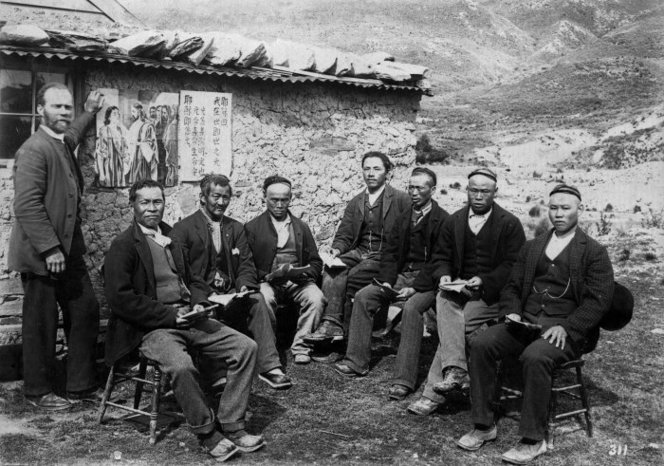
Chinese gold miners, with Mr Last in the middle, and Reverend Alexander Don on the far left, at the Kyeburn diggings circa 1900. Image courtesy of Te Puna Mātauranga o Aotearoa – National Library of New Zealand
Dunedin Chamber of Commerce
The Otago Goldfields attracted the first group of organised Chinese migrant workers. The Dunedin Chamber of Commerce (now the Otago Chamber of Commerce) recruited the workers when European miners left Otago to try their luck in the newly discovered West Coast goldfields. By late 1869, over 2,000 Chinese men had come to the land they would call the ‘New Gold Mountain.’
Many Chinese miners lived away from their European neighbours, without their families (who remained home in China) in extremely small, cramped and tiny cottages – no doubt a harsh existence during the freezing cold winters and scorching hot summers that Central Otago is renowned for. For more information on early Chinese migrants visit Te Ara – The Encyclopedia of New Zealand.
A fresh start
Immigration rules in New Zealand became more liberal in 1987, and new waves of Chinese migrants once again came to ‘New Gold Mountain,’ as their ancestors named New Zealand. Chinese migrants brought diverse skills and languages, and rich culture and traditions such as the lion dance and the lantern festival.
When the goldfields had been exhausted, many Chinese miners came to Dunedin to establish and run some of Otago’s early businesses. Their ancestors still call Dunedin home today.
A tale of two cities
In part due to the strong influence of Chinese in Otago’s history, the involvement of the local Chinese population and the wish to establish trusted business and trade opportunities Dunedin became sister city to Shanghai in October 1994.
The relationship is a driver behind Project Shanghai, a partnership of Dunedin businesses, educational institutions, the Otago Chamber of Commerce and the Dunedin City Council which aims to develop a broad range of links between the two cities.
A Dunedin Shanghai Association formed shortly after the relationship was formalised. The Association plays a key role in introducing and facilitating business, cultural, education and sports links between Dunedin groups and their Shanghai counterparts. It also hosts and facilitates a wide range of visitors and delegations from Shanghai. This role is reciprocated by the City of Shanghai in terms of visits to Shanghai by Dunedin delegations.
The Dunedin Chinese Garden
Once the sister city bonds had been formally recognised, talk began in 1998 of creating an authentic, traditional Chinese garden in Dunedin to recognise the contributions of the first Chinese people who came to Otago during the 1860’s and contributed so much both in commerce and culture over the years.
The Dunedin Chinese Garden’s design and construction was supervised and influenced by an architect from the Shanghai Construction and Decoration Company and the Shanghai Museum.
The Garden was pre-fabricated and assembled in Shanghai on a site identical in size and shape to that in Dunedin, then dismantled and transported here where it was reconstructed by artisans and supervisors from Shanghai.
The Dunedin Chinese Garden was blessed in June 2008, in the presence of Prime Minister Helen Clark and Chinese ambassador Zhang Yuanyuan and opened to the public on 8 June 2008. Prime Minister Clark returned to officially open the garden in September 2008.
Studying at the University of Otago
So, whilst the connections between China and Dunedin are historical and current, I am not Chinese – therefore I cannot give my perception on what it is like to live and study in Dunedin as a Chinese student at the University of Otago.
We caught up with Mike (Huang) Junjing who is here studying for a Bachelor of Physiotherapy (BPhty) to get his perspective as a Chinese student studying at the University of Otago and this video tells his story.
Take it away Mike…….
NB: The introduction is spoken in Chinese with Chinese subtitles, but the rest of the video is spoken in English with Chinese subtitles.
Nicky Richardson is an International Marketing Coordinator at the University of Otago. With degrees in music and marketing, she is a recent graduate of Otago herself – she loves Otago so much she ended up getting a job here!
Where are they now? 5 questions and answers with an Otago alumni.
There is no shortage of information on what universities can offer prospective international students in regards to programme choice, entrance requirements, accommodation and lifestyle, but once you have reached your goal and walked the stage to receive your hard earned degree or diploma, what next? Life doesn’t end when your course ends, it is just the beginning! We decided to catch up with University of Otago alumni Joyce Zhang to find out where she is, what she is doing, and her thoughts on what it is like to be an international student studying at Otago.
What did you study and why?
I studied English at the University of Otago Language Centre and Foundation Year UOLCFY and then studied telecommunication (Postgraduate Diploma in Science) in information science department which is on the ninth, tenth and eleventh floors of the Otago Business School building. It was the same major as my Bachelor degree, everyone in my bachelor class in China pursued a higher degree as we believe it will lead to better employability. I thought ‘why not improve my English along with a higher qualification’ so I decided to go overseas.
Where are you now?
I am working as a China Representative for the University of Otago and I am based in Guangzhou, China. I look after student recruitment and partnership engagement in the China market for the Otago University International Office (which I am very proud of – it is a dream for me to work for my university 😊).
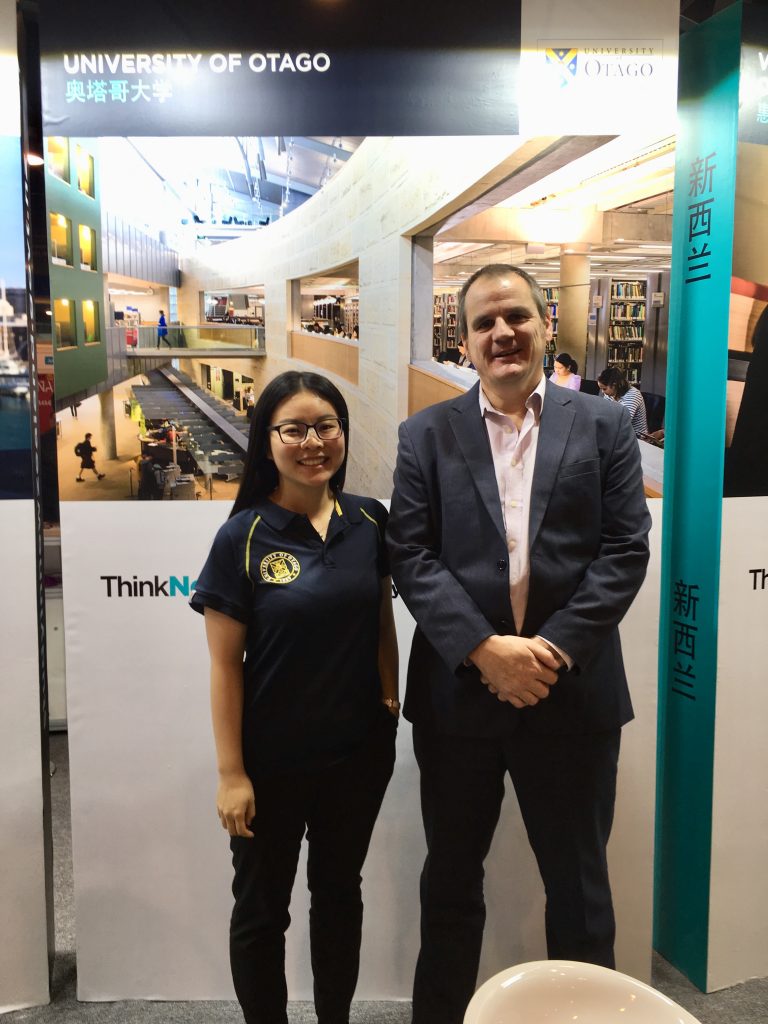
Joyce Zhang pictured here with Regional Marketing Manager for China, Dan Prain at an Education NZ Fair in Beijing, China last month.
Fondest memory of Otago
My fondest memory of Otago was my international friendships – you never lose them even though you’re not in the same country. A Japanese girl I met in Language Centre helped me a lot to improve my oral English so I achieved IELTS 7 in speaking after only 1 month of my arrival in NZ. A Korean girl with a working holiday visa invited me to visit her in Seoul two years ago, and we went to Shanghai Disneyland this March. I also met a nice couple from Denmark who studied as exchange students and we visited the Dunedin Chinese Garden and went skiing together. I am so proud of all these friendships and value them as treasures in my life… I know that I will never forget them and that they will never forget me and we keep in touch on social media.
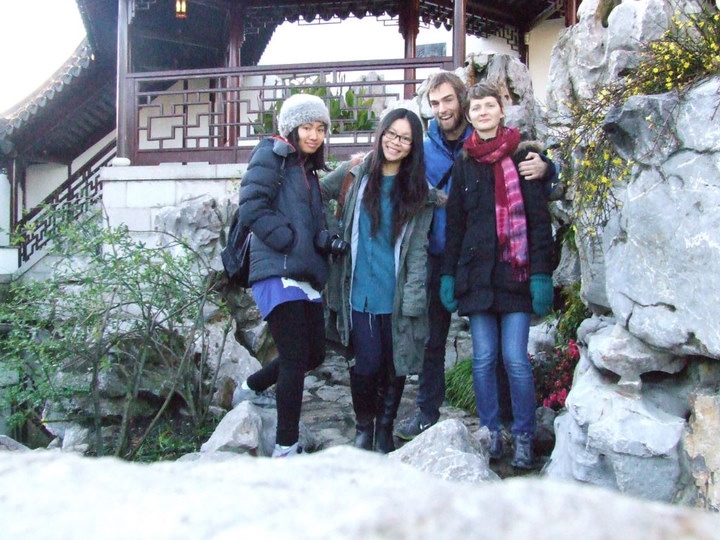
Joyce Zhang (pictured second from the left) at the Dunedin Chinese Garden with other postgraduate students she met and made friendships with whilst studying at Otago.
What advice would you provide for incoming international students about Otago?
Make friends and experience as much as you can. You might worry about your English, safety about travelling and all sorts of stuff, but please don’t stop exploring. Join in peer programmes, language exchange programmes, mentee and mentor programmes. There are many kinds of useful programmes designed for international students that will give you real engagement and help you become a true Otago student.
And just because we like to keep things a little bit light hearted, we thought we would throw in a random question…….
If you were on a deserted island and could only bring three things, what would you bring and why?
Hmmm water, food and… a boyfriend??!! Even if I was isolated, I can still be alive and enjoy every min as long as I can! 😊
If you want to maximise your employment opportunities with further study, want to improve your English speaking and make life long friendships, be like Joyce and find out more about studying at Otago!
Nicky Richardson is an International Marketing Coordinator at the University of Otago. With degrees in music and marketing, she is a recent graduate of Otago herself – she loves Otago so much she ended up getting a job here!

